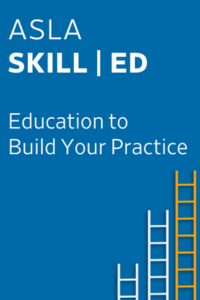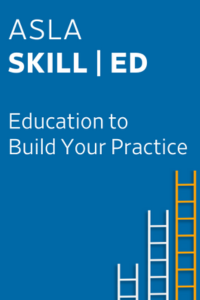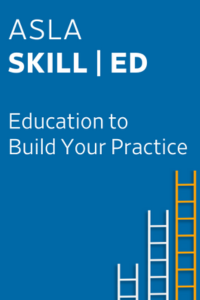
ASLA SKILL | ED: How to Speak Developer
-
Register
- Non-member - $249
- Member - $149
- Student Member - $25
- Associate Member - $89
This three-part webinar series equips landscape architects with the skills, knowledge, and communication strategies needed to navigate the development process effectively. Participants will learn how to identify opportunities for meaningful engagement, communicate with developers more effectively, collaborate and negotiate with reviewing authorities, and take a leadership role in planning, urban design, entitlements, and landscape architectural design for development projects.
-
Contains 5 Component(s), Includes Credits Recorded On: 05/28/2025
This introductory course provides landscape architects with a foundational understanding of the real estate and development process.
This introductory course provides landscape architects with a foundational understanding of the real estate and development process. Participants will explore key terminology, phases of development, and the critical role that design and planning professionals can play from project inception to completion. Through real-world context and practical tools, including a terminology handout, the course empowers participants to confidently navigate the development process and communicate their value as landscape architects.
Learning Objectives:
- Understand the core phases of the real estate development process, from market research and site selection to asset management and disposition.
- Recognize key financial concepts such as pro formas, land value, return on investment (ROI), internal rate of return (IRR), and carrying costs, and how these impact project planning and decision-making.
- Identify opportunities for earlier and more effective engagement of landscape architects in development projects, particularly during planning, financing, and entitlement phases.
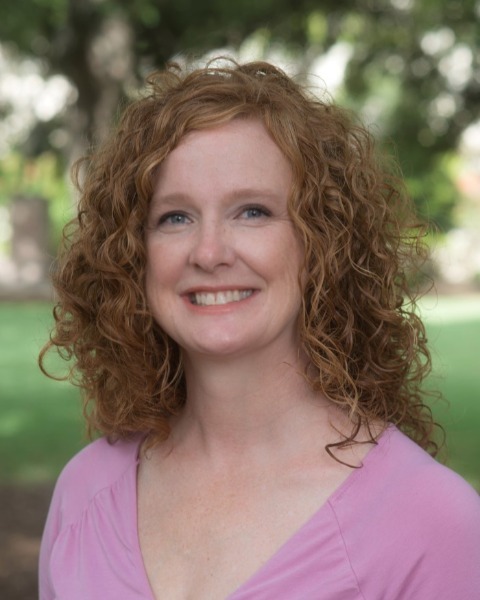
Mandy Pope
Director, Real Estate Center, McCombs School of Business
University of Texas at Austin
Mandy Pope is a finance lecturer and director of the Real Estate Center at The University of Texas at Austin’s McCombs School of Business, where she teaches real estate development to undergraduate and MBA students. Formerly a principal and executive at TBG Partners, she brings a strong background in landscape architecture, operations, and strategic management. Pope has led complex development projects and held leadership roles in finance, HR, and firm operations. She is active in the industry, serving on the boards and committees of the Real Estate Council of Austin and the Urban Land Institute (ULI).

Toshihiko Karato, ASLA (Moderator)
Senior Associate
Toshi is devoted to exploring the meaningful places that ground people to their cultural and ecological landscapes shaping their individual identities. From residential gardens to campus master plans, he strives to create places that are beautiful and resilient with a focus on the ephemeral experiences. Drawing on his background in history and engineering, he is passionate about integrating performative projects in broader narratives of place.
He received his Masters of Landscape Architecture and Masters of Architecture from the University of Virginia and his work has been recognized by the ASLA and ICAA. While in New York, he served on the board of NYSCLA and ASLA-NY Chapter advocating for the profession and its public service.
Toshi enjoys exploring the local cultural and natural offerings, as well as traveling near and far—often visiting the landscapes he grew up with in Japan and Germany.
-
Contains 4 Component(s), Includes Credits Recorded On: 05/29/2025
This course offers landscape architects a foundational understanding of development finance, including key models, funding sources, and current market conditions.
This course offers landscape architects a foundational understanding of development finance, including key models, funding sources, and current market conditions. Participants will explore various financing structures—from conventional loans to creative public-private partnerships—and learn how to identify opportunities to add value at different stages of the development process. The course aims to demystify financial concepts and help design professionals engage more confidently with developers and public agencies.
Learning Objectives:
- Describe key development finance models, including public-private partnerships, district financing, and lease-to-own arrangements.
- Distinguish between major sources and types of project funding, such as debt vs. equity financing, grants, and public subsidies.
- Identify strategic opportunities for landscape architects to contribute to and shape development projects through early-stage visioning, financing, and planning processes.
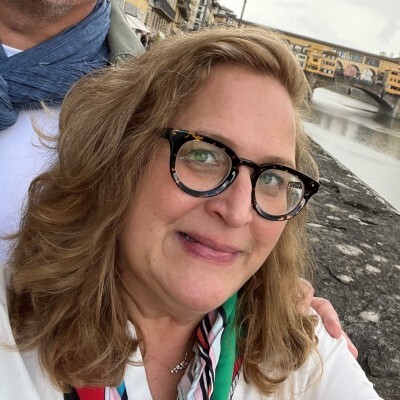
Molly McKay
Principal
Willdan Financial & Economic Consulting Services
Molly McKay is the Managing Principal at Willdan Group, where she leads a Washington, DC-based real estate and economic development consulting practice focused on market feasibility, strategic planning, and public-private partnerships. With global experience across 25 U.S. states and multiple international regions, she advises on projects ranging from urban infill to large-scale innovation districts. A Certified Economic Developer and Fulbright Scholar, Molly brings expertise in sustainable development, real estate finance, and urban planning. She serves in leadership roles with Willdan’s Smart Cities Working Group, the Virginia Center for Innovative Technology, and ULI’s Redevelopment and Reuse Council, where she champions inclusive, impactful development practices.
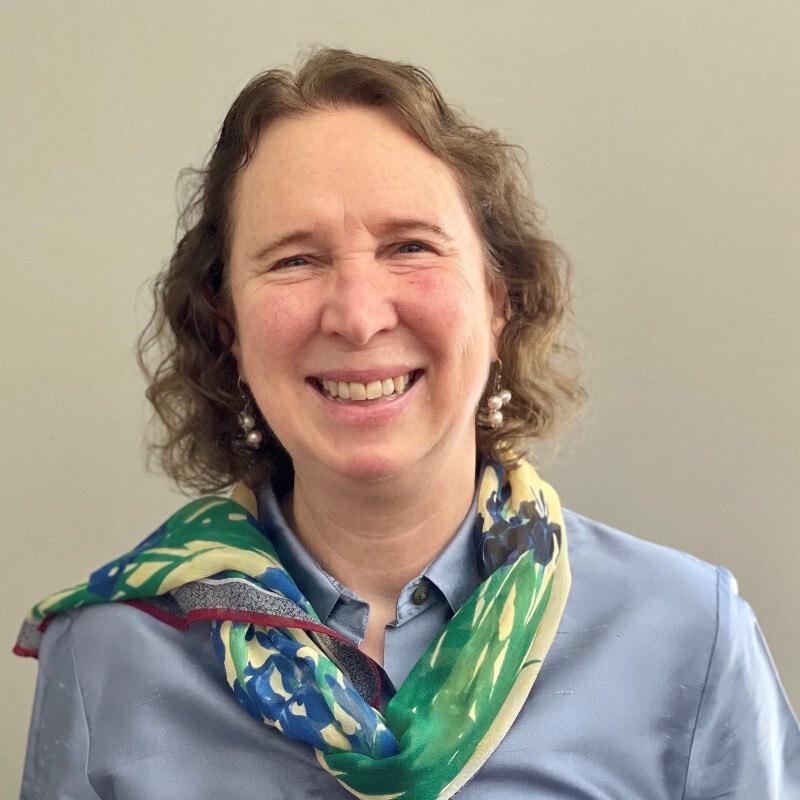
Gail Henderson-King, ASLA, PLA, EDFP (Moderator)
Principal
Henderson King Consulting
Gail Henderson-King is a principal at Henderson-King Consulting, that specializes in landscape architecture, community and economic development projects focused on designs that integrate the natural and cultural environments for successful places to live, work and play. Gail strives to enhance and strengthen the physical characteristics of a site through context sensitive creative designs. With extensive expertise in project management, master planning and development, and site context designs, Gail seamlessly integrates design, policy, and community engagement in her work.
-
Contains 4 Component(s), Includes Credits Recorded On: 05/30/2025
This session explores how design thinking, ecological sensitivity, and community-focused strategies can influence zoning and entitlement processes to result in better developments and stronger public-private alignment.
Entitlements are often seen as the domain of attorneys, engineers, or planners—but landscape architects bring a unique, and often underutilized, perspective to the table. This session explores how design thinking, ecological sensitivity, and community-focused strategies can influence zoning and entitlement processes to result in better developments and stronger public-private alignment.
Using real-world case studies, this session unpacks how landscape architects can play a strategic role in advocacy, visioning, and negotiation—while translating complex regulations into meaningful design outcomes. You’ll walk away with tools to engage more confidently with city staff, community groups, and neighbors—and help your team get to "yes."
Learning Objectives:
- Explain zoning basics and regulatory processes to better evaluate project constraints and communicate impacts to stakeholders.
- Understand the steps, stakeholders, and decision points that shape land use entitlements—from rezonings to PUDs—and how design professionals can influence outcomes. Develop clear and compelling communication strategies tailored to different audiences, including public agencies, community members, and clients.
- Learn how landscape architects can build trust with public agencies, developers, and communities by offering value beyond aesthetics—through ecosystem services, public space planning, and stakeholder facilitation.
- Apply best practices for community engagement, permitting negotiations, and working with nonprofits to advance development projects more effectively.
- Gain insight into negotiation techniques, tradeoffs, and how to advocate for community and environmental goals while staying aligned with financial and political realities.
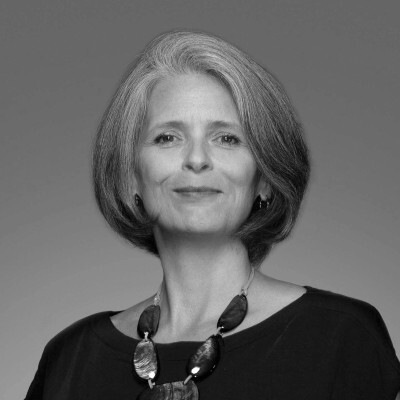
Rebecca Leonard, FASLA, FAICP, CNU-A
Founder
Lionheart Places, LLC
The founder of Lionheart Places LLC, has over 25 years of experience in community planning, urban design, stakeholder engagement and facilitation and landscape architecture. With a successful career in both the public and private sector, Rebecca understands the needs of both sides and has mastered negotiations between them. She has worked closely with her private development and public agency clients to ensure that their projects are implemented and their visions are realized.

Han Zhang, ASLA, PLA, LEED AP BD+C (Moderator)
Principal
O2 Design
Han leads a small culturally diverse team at O2 Design that handles projects across various types, scales, and design strategies, ranging from residential courtyards to hundred-acre master plans. She is experienced in project management and works closely with clients to stay on schedule and budget. She applies holistic and systematic thinking to create innovative design solutions to multifaceted challenges and strives to deliver exceptional results on sophisticated projects. Deeply influenced by her dual-culture background, Han brings her unique character, cultural interpretation, and inspiration to her design. Devoted to and passionate about her work, Han pursues simplicity, functionality, and artistry in design.

